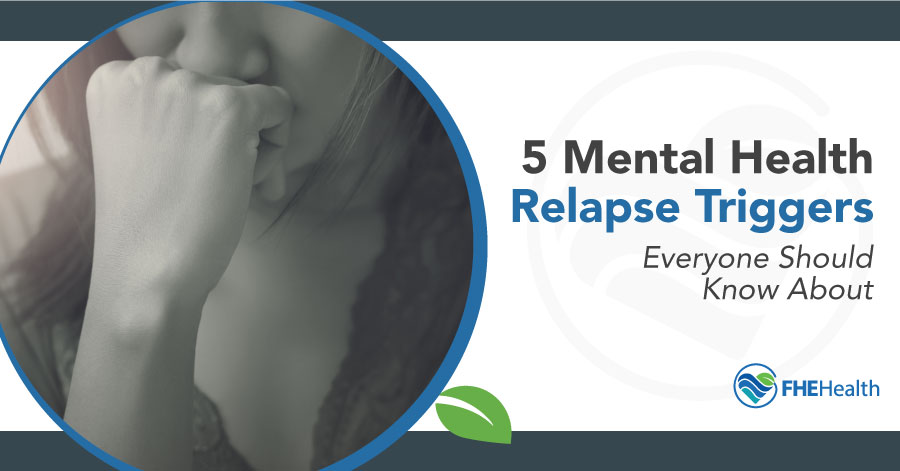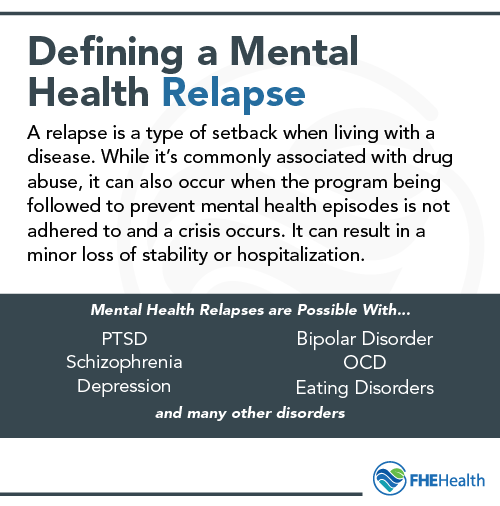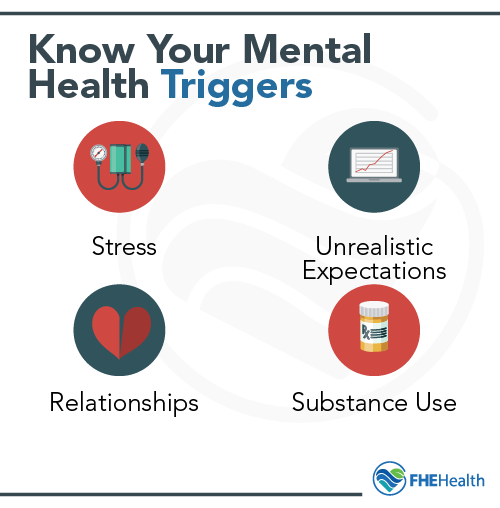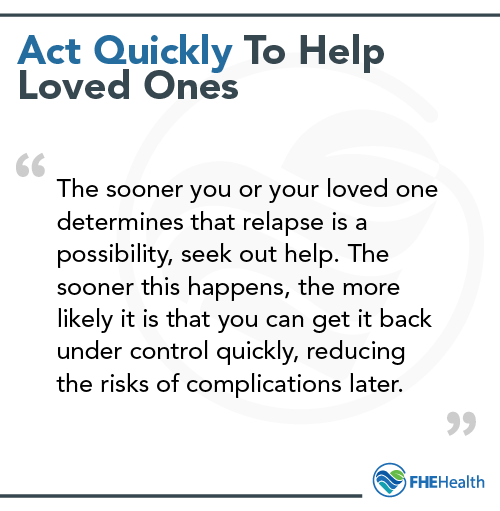
With 12.8% of adults dealing with feelings of anxiety and 4.8% of adults experiencing depression, mental illness is a daily reality for millions of Americans. Therapy can ease the symptoms, but it doesn’t offer a cure–and for someone who’s already on the edge, a single argument or setback could trigger a mental relapse. Fortunately, planning ahead could help you dodge a potential relapse or get back on your feet once the moment passes.
Mental Relapse Meaning
 A relapse is a type of setback. It can occur in most types of mental illnesses, including depression, anxiety and substance abuse disorder. When it happens, it can cause a person to experience severe consequences and may lead to hospitalization. Though this can be a challenge, those suffering a relapse may still be able to get help to restore balance and stability to their lives.
A relapse is a type of setback. It can occur in most types of mental illnesses, including depression, anxiety and substance abuse disorder. When it happens, it can cause a person to experience severe consequences and may lead to hospitalization. Though this can be a challenge, those suffering a relapse may still be able to get help to restore balance and stability to their lives.
Each disease or condition may have its own set of relapse signatures:
PTSD Flashbacks
A person suffering from post-traumatic stress disorder may begin to feel anxiety and a loss of control in certain situations. Even if they seemed to have been fully in control previously, they may experience instances of heightened awareness of their surroundings linked to the traumatic event.
Schizophrenic Episodes
A person with schizophrenia may attain control over their condition with medication and therapy, but they could still develop a sudden change in personality. This is referred to as a schizophrenic episode. It can cause a break during the treatment process and a sudden loss of reality. It can also lead to a more significant break during psychotic episodes.
Depressive Periods
Depression is one of the most challenging of all conditions to monitor relapse for because people feel sad from time to time as a regular part of life. However, a person with depression who seems suddenly sad without an obvious cause may be suffering from a relapse. This can be sudden and significant, increasing the risk of suicidal thoughts.
Manic or Bipolar Episodes
In this situation, a person may begin to display the typical very high and very low range of emotions that occur in bipolar. When a relapse happens, a person can become unstable quickly, requiring help.
Common Mental Relapse Triggers

It’s possible to know your triggers. In other words, just like with addiction relapse, by avoiding any type of trigger that could cause a relapse, it may be possible to maintain mental stability. Some common types of triggers include the following:
Stress
Almost everyone deals with daily stress, but those with a mental illness may struggle with managing it well. This can trigger an emotional relapse, especially if that stress is sudden, significant or long-lasting. Stress taxes the brain and the body due to the constant presence of fight-or-flight hormones. This makes it hard for a person with a mental illness to maintain control. It can also impact the function of medications.
Relationship Issues
Breaking up with a loved one, divorce or death are common relationship triggers. These may not be situations you can avoid, though. Rather, if you are going through these more challenging instances, it is best to work closely with your therapist and doctors to monitor your condition to help you avoid the onset of a significant relapse. A person with a mental illness of any type may find it hard to navigate complex relationships with ease. This may mean there’s a need for more family members or support group therapy.
Unrealistic Expectations
Bipolar condition is a good example of how unrealistic expectations can create problems for a person with mental illness. If you’re hoping for a very good outcome to happen, and it doesn’t happen, it can create a very sudden drop in your mood. In some situations, these unexpected expectations can be related to school, relationships, work, or just day-to-day life. It can lead to difficulty coping with reality, especially when those expectations are life-changing.
Substance Use
Those who use drugs or alcohol while using medications for mental illness will find it challenging to control relapses. These substances change brain chemistry enough to make it very difficult to control outcomes. Many times, people using substances like this may be doing so because their current treatment plans are leaving them vulnerable to additional mental anguish or difficulty. Recognize the use of a substance like this as a good reason to get more advanced help.
Loss of Medication
This is the most common reason for a mental health relapse — and the most preventable. Consistency with medications is essential. Over time, your doctor may need to adjust them to better meet your needs.
The Importance of Self-Care in Preventing Relapse
Self-care is an important facet of personal health with both day-to-day and long-term benefits for any individual, but it’s especially important for those who may struggle with mental health triggers, recovery and relapse. Try including some of these activities in your self-care routine:
- Practicing healthy sleep habits
- Eating nutritious foods
- Drinking enough water
- Practicing meditation and mindfulness
- Exercising regularly
- Setting personal boundaries
As you adopt new self-care practices, pay attention to how they make you feel and if they benefit your physical and mental health.
Make it a Priority
Although self-care can seem like a chore and is easy to neglect during periods of high stress or busyness, those periods are often when it’s most important. Juggling obligations can make it challenging to accommodate basic self-care, such as good sleep, meditation or quality meals. Still, taking even a few minutes to prioritize yourself can not only reduce anxiety, depression and other symptoms, but it can reinforce the fact that your needs are worth prioritizing.
Balance Your Self-care
Self-care is more than practicing yoga or meditation and can involve different aspects of your life. To improve short- and long-term wellness, a self-care practice should address the following facets:
- Emotional
- Spiritual
- Intellectual
- Physical
- Environmental
- Financial
- Occupational
- Social
Keep it Simple
Just as it’s easy to neglect self-care, it’s easy to overcomplicate it. By obligating yourself to too many wellness practices, self-care can become an overwhelming and exhausting task. In turn, an overly complex and unsustainable approach can lead to anxiety and negative feelings about tasks that are supposed to be good for you.
Instead, keep your self-care practices simple to find what works for you. Start by addressing basic needs such as sleep, nutrition and other vital aspects of your health. Once you’ve established a healthy baseline of self-care, you can work toward adding other beneficial and sustainable self-care practices.
Set Goals
Goal-setting is an important part of sustainable and effective self-care. By identifying tangible goals you can work toward, you can create intentions and mindfulness around your self-care practices that help you stay focused. For example, although 10 minutes of meditation can be challenging at first, setting an intentional goal can remind you why it’s important to stick with it. Make sure to start with small goals to manage your expectations and priorities.
Find Support
Surrounding yourself with supportive individuals can help you focus on your self-care practices as well as find new ones. Whether you’re working with a counselor, exercising with a friend or attending a group art class, being around similar mindsets can help you feel supported and focused.
Know the Warning Signs
Knowing the signs of a possible relapse could help you take action before the stress overwhelms you. Warning signs of a relapse include:
- Irritability
- Insomnia
- Fatigue
- Headaches
- Feelings of hopelessness
- Depressed moods
- Feeling “on edge”
If you suspect that you’re headed for an emotional relapse, contact a therapist or mental health clinic as soon as possible.
Frequently Asked Questions
What is a mental health relapse?
A mental health relapse occurs when the symptoms of a condition, such as depression, anxiety, schizophrenia or bipolar disorder, suddenly return. The individual might feel like they’ve lost their progress and wonder why they sought help in the first place. During this time, they’ll need support from their loved ones as they get back on their feet.
What triggers a mental relapse?
Typically, a mental relapse occurs when an individual experiences stress or trauma and doesn’t find relief with their coping strategies. Not taking their medication could also cause the symptoms to return.
Could substance abuse cause a mental relapse?
Substance abuse disorder is a common reason for an emotional relapse. The substance may interfere with the individual’s ability to think and make rational decisions, leading to emotional outbursts, aggressive behavior or suicidal ideation. Lingering guilt from substance abuse could also provoke a mental relapse.
Seek Help for Mental Health Relapses
With a team of compassionate counselors available 24 hours a day, our team can help you with any mental illness relapse. Reach out to FHE Health to learn about the options available to you today. Our programs include group and individual therapy, breathwork, acupuncture, medication management, neurofeedback training and more.







